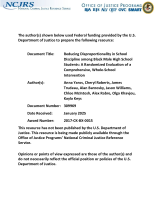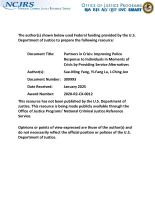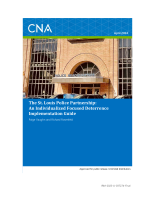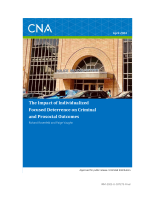Randomized controlled trials
Improving Employment and Reducing Recidivism among Prison Offenders via Virtual Reality Job-Interview Training, Final Report
A randomized controlled trial on the interconnected systems framework for school mental health and PBIS: Focus on proximal variables and school discipline
Evaluation of the SEPTA Transit Police SAVE Initiative
A pragmatic randomized controlled trial of virtual reality job interview training in prison employment services
Evaluating a Cognitive Behavioral Approach for Improving Life Outcomes of Underserved Young Women: A Randomized Experiment in Chicago
Interactive Computer-Assisted Recovery Enabler (ICARE): Treatment Support Tool for Substance-Using Offenders, Final Technical Report
Intervention Development of the Resiliency in Stressful Events (RISE) Curriculum: A Trauma-Informed Reentry Approach for Men
Reducing Disproportionality in School Discipline among Black Male High School Students: A Randomized Evaluation of a Comprehensive, Whole-School Intervention
Impact Evaluation of Complementarities Between PBIS and Restorative Justice
Developing, Implementing, and Evaluating a Police Fatigue Risk-Management Strategy for the Seattle Police Department
Partners in Crisis: Improving Police Response to Individuals in Moments of Crisis by Providing Service Alternatives
Establishing Police-Led Science in the Wauwatosa, WI Police Department
Identifying and Treating Overdose Hotspots: A Randomized Controlled Trial of Place-Based Harm Reduction Strategies
Parent Attitudes, Comfort, and Perceptions About Dating Violence: The Moderating Effect on Son Report of Parent Openness to Communicate
Adolescent Mental Health and Resilience Before and During the COVID-19 Pandemic
The St. Louis Police Partnership: An Individualized Focused Deterrence Implementation Guide
The Impact of Individualized Focused Deterrence on Criminal and Prosocial Outcomes
Deploying Body-worn Cameras in a Jail Setting: Impacts and Lessons Learned
Celebrating 10 Years of NIJ’s Law Enforcement Advancing Data and Science (LEADS) Scholars Program - 2024 NIJ Research Conference
In 2014, NIJ established the Law Enforcement Advancing Data and Science (LEADS) Scholars Program to support research-minded, mid-career sworn law enforcement officers working to integrate research into agency policy and practice. The LEADS Scholars Program helps participants develop independent research and provides support to identify current evidence on priority issues.
See the YouTube Terms of Service and Google Privacy Policy








